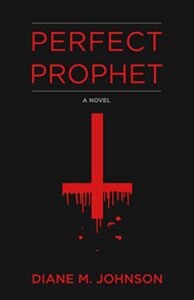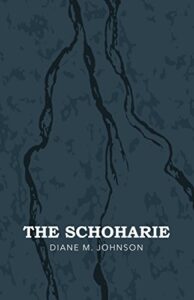Prophet Reborn received a 4+ star review, making it an IndieReader Approved title.
Following find an interview with author Diane M. Johnson.
What is the name of the book and when was it published?
Prophet Reborn was published in August of this year. It’s a sequel to Perfect Prophet.
What’s the book’s first line?
The first line comes from the head of the main character Lucas, I should be dead.
What’s the book about? Give us the “pitch”.
As a sequel, this book takes a look at the villain of the first book. Lucas is a young, failed Satanic cult leader (and a sociopath) on a quest to find redemption for the evil he’s done. He wants to atone for the torture and torment he put his brother Alec through, a brother who was once an atheist death metal celebrity, now transformed into a celebrity faith healer. Lucas finds a Christian commune to take refuge in. Unfortunately, the leader of that commune is not the best representative for the Christian faith, and he sends Lucas on a mission of redemption that involves proving his brother Alec is a fraud. Because of Lucas’ sociopathic tendencies, the choices he makes to redeem himself put Alec and his family back in danger.
What inspired you to write the book? A particular person? An event?
I’m often inspired by “what ifs.” With Perfect Prophet, I asked, what if a hard core atheist could perform a miracle? With Prophet Reborn, the question became more twisted. How would a sociopath, who once identified with all things Satanic, try to find redemption?
What’s the main reason someone should really read this book?
I hope people will look at the characters in this book and appreciate them for what they are: flawed. The alleged faith healer Alec (the Perfect Prophet) is a neurotic victim with PTSD, and he struggles with his faith. He struggles to believe in himself, and yet he somehow manages to bring faith to others. Lucas, on the other hand, believes in something. He wants to be forgiven, and while his quest can be viewed as something noble, his actions are often either socially unacceptable or flat out criminal. I hope the reader finds themselves rooting for some of the things the characters do while questioning if they should. Having faith is often a challenge, but blindly following the leaders of our faiths as if they were gods is a dangerous road to travel.
What’s the most distinctive thing about the main character? Who-real or fictional-would you say the character reminds you of?
The main character Lucas would probably be defined as a sociopath in the real world. But he realizes that to some degree, which makes the actions he takes to “save himself” all the more controversial. At least I hope that’s how it comes across. I do have a picture of Lucas in my mind, but he’s Lucas. I didn’t model him after anyone specific.
If they made your book into a movie, who would you like to see play the main character(s)?
I specifically try to leave some ambiguity when I physically describe my characters. I would love to see my books become movies, but there are a lot of actors out there, and who knows? Some new up and comer might turn out to be perfect for a role, or even bring something of themselves to a role that would make the characters resonate. I think I describe Alec with “brilliant eyes of the deepest color,” at one point. But I don’t say what color. Green, blue, brown… I’d rather have the reader imagine their own favorite color.
When did you first decide to become an author?
Haha! In third grade I wrote a “Madagascaresque” short story that my teacher thought was pretty good. I tried to write a “WKRP in Cincinnati” spec script when I was in middle school. That probably betrays my age, and I probably didn’t realize it was called a spec script then. I’ve written several screenplays and TV ideas since. Nothing that sold, but plenty that did well in competition. I didn’t officially decide to become a book author until about three years ago when I adapted my first book, The Schoharie, from a script.
Is this the first book you’ve written?
No, The Schoharie is the first official book I’ve written. It was also an IndieReader Approved choice, so thank you!
How much time do you generally spend on your writing?
I try to write every day. It could be for ten minutes before I get out of bed, or it could be as much as three hours on and off throughout the day. My goal is to find time to write every day, but I don’t hold myself to a specified amount of time. Writing is writing. But I consider research and editing as part of the process too.
What’s the best and the hardest part of being an indie?
Building a story, finding solutions when you think you’ve written yourself into a corner is the best part of writing. I love it when I feel like I know who my characters are inside and out. It’s my creation without limitations. The hardest part of being indie is marketing for me. That’s a whole different skill set. I want people to read and enjoy my work, but I don’t want to pester people to read the book, if that makes sense.
What’s a great piece of advice that you can share with fellow indie authors?
Find fulfillment from enjoying what you write. Don’t dwell on sales numbers, which is often a hard thing to do. Celebrate good reviews, but brace yourself. Not everyone shares the same opinion. When you receive unfavorable reviews (everybody does), look up one of your all time favorite books and read the unfavorable reviews people gave it. Every successful author has received unfavorable reviews.
Would you go traditional if a publisher came calling? If so, why?
Yes, of course. There’s a level of validation that comes from being accepted by a traditional publisher. But it’s a business like any other. Traditional publishers have a bottom line, and they need to feel certain that an author’s work is going to make a profit. They are going to stick with established authors who have a proven track record. They only have a small window of opportunity to give new writers a chance. There are a lot of writers who hope for that chance.
Which writer, living or dead, do you most admire?
When I think of writers I admire, I usually think of screenwriters. I admire Callie Khouri for Thelma and Louise. I admire Jordan Peele for his fresh take on horror. I admire television writer/creators like Vince Gilligan for creating morally flawed characters that we somehow want to root for. There are too many writers that I admire on some level, but right now I think that the level of talent in the screenwriting and TV writing community is extraordinary.
Which book do you wish you could have written?
The Shining — and there’s a story behind that. I grew up on Stephen King books. He was my introduction to horror as a kid. Then The Shining was made into a movie, screenplay written by Diane Johnson. Not me, but the more well known Diane Johnson. The Shining was my favorite book at the time. And then they made it into a movie. And, technically, my name was on it. And I thought, man. I wish I wrote The Shining.



